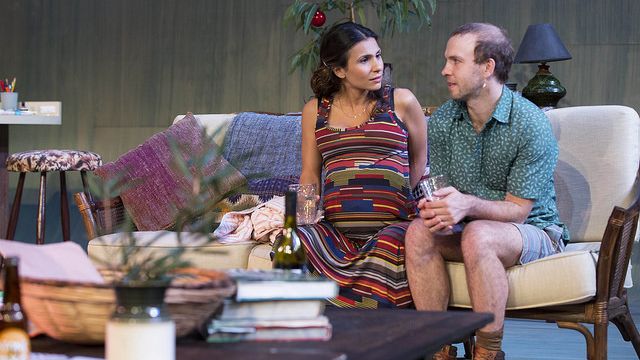The Great Fire
The opening scenes of this new play by Kit Brookman are so promising. The introductory dialogue is crisp and the cast has picked up the natural rhythms that make it recognisably Australian. The characters and setting too, in these opening scenes, are familiar: members a family returning home from different parts of the country to celebrate Christmas.
In this instance ‘home’ is the kitchen-living room of a rambling semi-detached house, once part of a ‘commune-style’ arrangement purpose built by three ‘arty’ couples in the 1970s in the Adelaide Hills. Designed by Michael Hankin, the set is stunningly realistic, cluttered with the paraphernalia of years, but totally workable.
It’s hot, the country is dry – and all of the characters are a bit edgy. The daughter and son-in-law rent the house from their parents (who now live in Sydney) and are finding it hard to maintain and to afford the rent. The son and daughter-in-law who live ‘in town’ are expecting the first grandchild. The younger son is returning from six months overseas following a devastating break-up. Everyone works in ‘the arts’ and most are unemployed. The parents, now retired, are considering returning to their old home …

There are all the earmarks of a good story. The characters are well drawn, the situation reasonably plausible – and for the first hour it moves along fairly well. Unfortunately the second hour drags … and drags … especially the final farewells where I found myself mentally screaming “Just go!”
This is a new play and surely director Eamon Flack could have suggested editing that would have honed the script without affecting the plot lines or the depth of the Brookman’s characters … who are acted well by a very experienced cast. Their interpretation of the characters and their inter-reactions are believably real – it’s just a pity that they are left to linger on stage for a so long.
Shelley Lauman and Eden Falk open the play. As the present ‘custodians’ of the house, they establish the undercurrent of unrest that permeates the play – and the differing tempos that become intrinsic to the first act. Falk’s character, Michael, is fast and loud and has never really felt part of the family. Lily, is more introspective and obviously unsettled, and Lauman sustains this underlying tension despite the busy-ness of the plot.
Marcus McKenzie as the younger son, Tom, is even more introspective, carrying as he does the ‘baggage’ of his broken relationship, unfinished university courses and spending a small inheritance. McKenzie interprets through silences and stillness that say more about his internal struggles than any words.
His older brother, Alex, played by Yalin Ozucelik, is waiting anxiously to hear about the result of job interview. He is jumpy, preoccupied, resentful and worried about supporting a baby. Ozucelik finds all of this in a very tightly controlled performance. Hannah, his wife, is the calm in the storm of this over sensitive family, and Sarah Armanious plays her with perceptive poise. She watches, advises, changes the subject – and keeps smiling despite the unrest around her.
 Patrick and Judith, father and mother to this unsettled brood, are depicted astutely by Geoff Morell and Genevieve Picot. Morell plays the aging hippy patriarch with a keen awareness of timing and pace and subtle nuance. Picot’s Judith is less sure of herself, but very aware and perceptive. Both performers bring authenticity and substance to the situation, as does Sandy Gore who plays long-time friend and hippy, artist neighbour, Alison. Accepted and accepting, Gore’s Alison is almost a ghostly presence who drifts in and out of the house, and the family, as she has done for years.
Patrick and Judith, father and mother to this unsettled brood, are depicted astutely by Geoff Morell and Genevieve Picot. Morell plays the aging hippy patriarch with a keen awareness of timing and pace and subtle nuance. Picot’s Judith is less sure of herself, but very aware and perceptive. Both performers bring authenticity and substance to the situation, as does Sandy Gore who plays long-time friend and hippy, artist neighbour, Alison. Accepted and accepting, Gore’s Alison is almost a ghostly presence who drifts in and out of the house, and the family, as she has done for years.
Lynette Curran and Peter Carroll bring a somewhat sad, light relief as grandparents Mary and Donald. She is sprightly and ‘with it’; he in the difficult stages of dementia, is lost and confused. Curran brings sparkle to the production. Carroll, with his usual perspicacity, has observed carefully to bring significant truth and frailty to his character.
With such a cast, and the inherent possibilities of the script, the production will stand, but ‘twould perhaps have been best to ‘try’ it first on the Downstairs stage – as has happened oft’ before – allowing a ‘workshop’ season to find the real strength and length of the play.
Carol Wimmer
Photographer: Brett Boardman
Subscribe to our E-Newsletter, buy our latest print edition or find a Performing Arts book at Book Nook.

